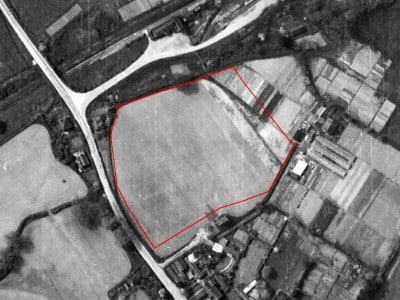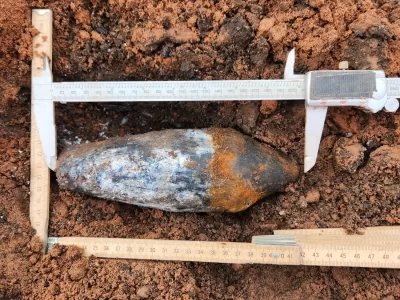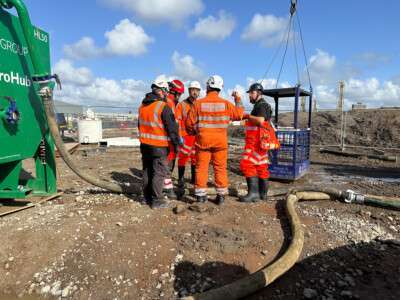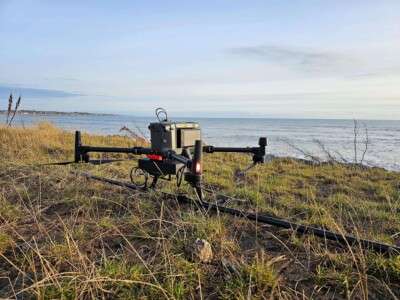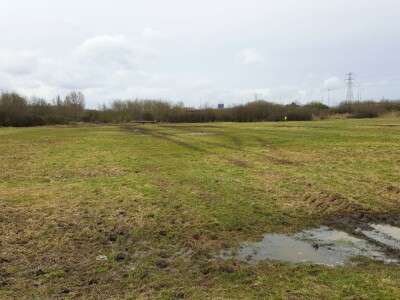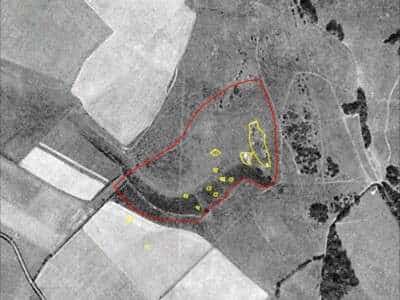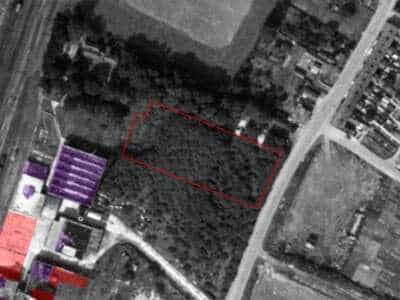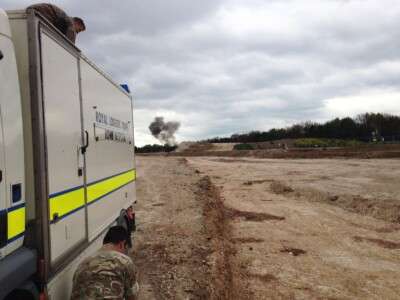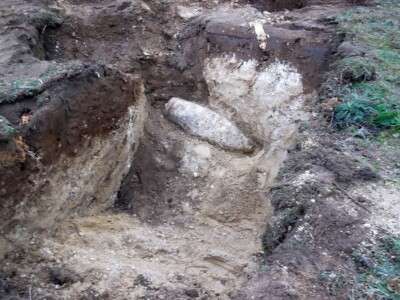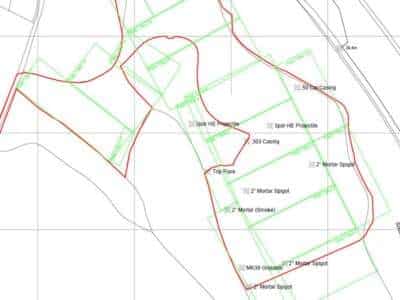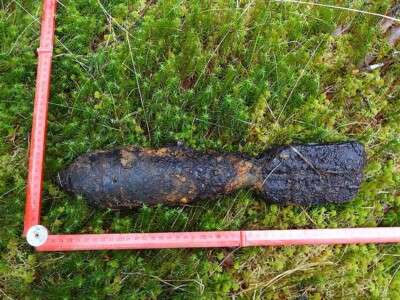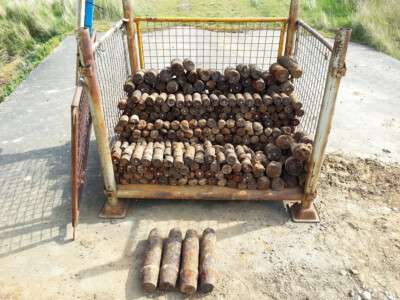Home » Resources » Case Studies »
Case Study Overview
Client
Dunelm Geotechnical & Environmental Ltd
Location
Full Sutton, Yorkshire
Industry
Construction
Project Duration
October – December 2020
Services
UXO Disposal
Detailed UXO Risk Assessment
Non-intrusive UXO Survey
UXO Support
Target Investigation
UXO Risk
‘Medium-Risk’ assessed from buried Allied military UXO
50+
Items of UXO discovered and disposed of
Means of Disposal
Specialist Thermite Lances
Challenge
In October 2020, 1st Line Defence was contacted by Dunelm Geotechnical & Environmental Ltd to provide a Detailed UXO Risk Assessment on a site within a site near Full Sutton in Yorkshire.
The client’s scope of works was to undertake a series of investigatory boreholes and trial pits across the site. They were aware that the site had a military history, and wanted to manage the potential UXO risk – in line with CIRIA C681 guidance.
Process
Stage 1 – Detailed UXO Risk Assessment
A Detailed UXO Risk Assessment of the site area was completed by 1st Line Defence in November 2020.
The assessment found that during WWII, the site was located within the boundary of RAF Full Sutton, a former bomber airfield opened in 1944. The station continued to be operated by the RAF until 1963, serving as a both Transport Command, Advance Flying Training School and ‘Thor’ ICBM base in the post-war period.
RAF site plans and WWII-era aerial imagery indicated that the site encompassed much of the station’s Bomb Store area. Four large bunded high explosive bomb stores were located on-site, as well as Incendiary Bomb Stores, Small Bomb Container Stores, Fused and Spare Bomb Store and other associated structures such as a Flame Float Store, Component Store and Pyro Store. Adjacent areas of open, apparently unused ground were also later incorporated into the site. Generally, RAF bomb store areas would have been subject to UXO clearance operations at the time they were decommissioned. However, such operations were often inefficient – if indeed they were undertaken at all.
It was not uncommon for unwanted and unused weaponry to be disposed of on-site, sometimes in designated open areas away from the stores – but occasionally also in and around the stores themselves. No specific record of ordnance clearance having been undertaken post-war could be found.
Because of the previous use of the area, the site was deemed to be at a ‘Medium-Risk’ of UXO contamination, and additional UXO Risk Mitigation measures were recommended.
Stage 2 – Risk Mitigation Strategy
1st Line Defence recommended that a Non-Intrusive UXO Survey and Target Investigation operation be undertaken within the open/undeveloped areas of the site where intrusive works were planned. A UXO Watching Brief was also recommended for open excavations planned in areas of the site where a Non-intrusive UXO Survey was not suitable/possible.
This methodology would allow UXO-related items to be found, checked, identified and removed from site – and the risk from UXO be reduced to as low as reasonably practicable (ALARP).
Stage 3 – Non-intrusive UXO Survey
1st Line Defence undertook a Non-intrusive UXO Survey of the main site area in November/December 2021, using a Magneto MXPDA system – and the survey area was later extended to an adjacent field.
Our in-house geophysical team processed the survey data and a number of anomalies/targets of interest were selected for target investigation.
Stage 4 – UXO Support
During the first Target Investigation operation, various items of explosive-related ordnance were recovered by the 1st Line Defence clearance team:
- 31 x Practice Bomb Bodies, alongside 21no. Bomb Tails
- 2 x Practice Bombs, alongside 30no. tails
- 1 x Ammunition box
- 1 x 1,000kg bomb nose plug
- 8 x British Tail Pistols
- 6 x Inert Tail Pistols
- 1 x 28 Tail Pistol
A total of 88 additional items of ‘demolitions waste’ were recovered and a ‘burns pit’ was encountered. Many of the items encountered were identified as still being ‘live’, with others in such poor condition that their state could not be confirmed with confidence.
Many of the finds came from an area of the site that our specialists identified as a ‘burial pit’. Over 40 General Purpose (GP) Bomb Tail Pistols (including the Bakerlite variant) were found in very good condition at that location alone.
A requirement for on-site demolitions was identified and a suitable area was selected but due to use of the adjacent site area, the use of conventional explosives was not permitted.
Stage 5 – UXO Disposal
Following the large volumes of live explosive ordnance (or ordnance which could not be deemed to be FFE) discovered on-site, local police/military EOD teams could not support the project – and all UXO Disposal operations were managed directly by 1st Line Defence.
Thermite lances were utilised as the primary disposal method to help reduce the risk associated with using plastic explosives for demolitions. Alarmed and monitored explosives storage magazines were installed on-site to hold the UXO finds until disposal operations were carried out.
Each demolition operation was undertaken in accordance with the 1st Line Defence site specific Explosives Management and Disposal Plan. This included strict safety cordons on demolition days to prevent members of the public accessing the site area.
The use of Thermite was particularly useful when items of explosive ordnance found were deemed unsafe or too hazardous to move, and following the procedure – each item of ordnance was carefully investigated and formally certified as FFE. All FFE scrap and remaining items were removed by a commercial waste disposal company who took the items to a third-party waste disposal facility to be safely destroyed.
Outcome
Following approximately three-months of ground remediation works, the risk from UXO was reduced to ALARP status – no further suspicious items were discovered and the project was completed on-schedule.
Click on the following link to download a PDF copy of the Case Study for Full Sutton, Yorkshire.
Latest Case Studies
Do you have a project in Yorkshire? Need advice but not sure where to start?
If you need advice about UXO risk mitigation in Yorkshire, contact us today and we will guide you through the process.
Contact Us
* indicates required fields
